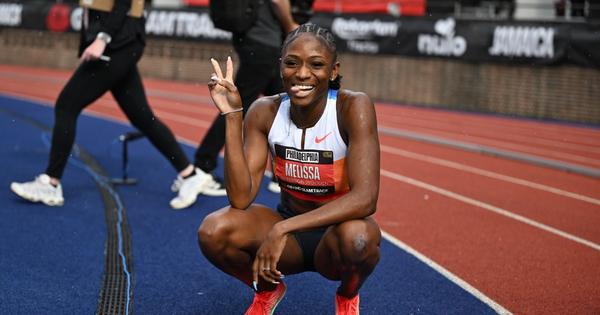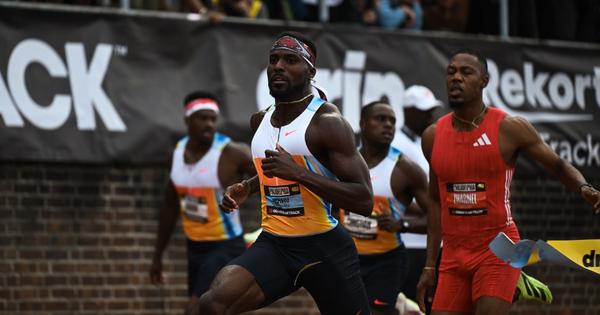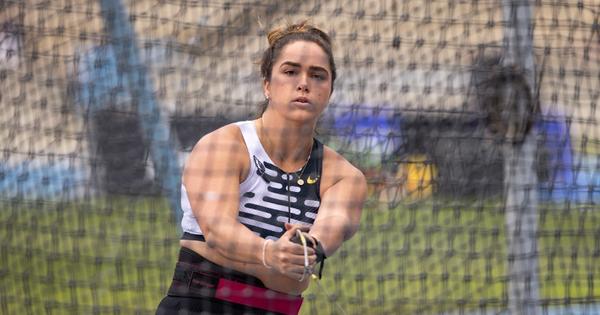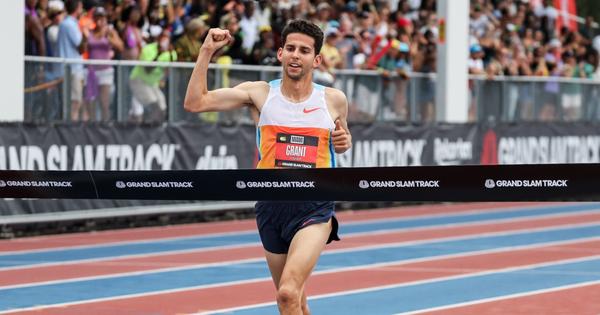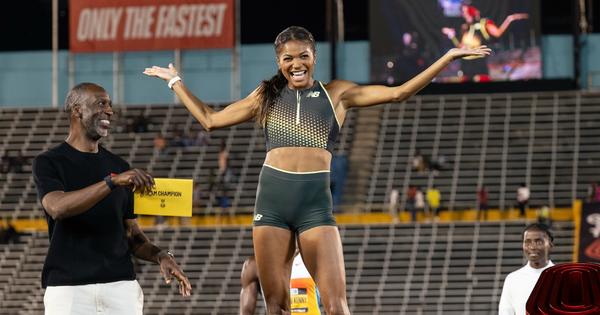By David Melly
June 4, 2025
It turns out that good things do come in threes.
Last weekend, Michael Johnson and his merry band of athletes took his Grand Slam Track circus to Philadelphia’s historic Franklin Field, debuting a newly-streamlined program and two-day meet format to generally positive reviews. Perhaps the most important change of all came just outside the oval: the fans. Kingston had a large (and largely empty) stadium, Miami had a tiny, but full stadium, and Philly finally delivered the best of both worlds. It’s noticeable how much a loud, high-energy crowd improves the event both on television and in-stadium, and Philly’s estimated 10,000+ ticket sales paid off for everyone watching from home as well.
It can’t hurt that the races themselves gave the fans plenty to cheer about. GST claiming the mantle of “only the fastest” for itself and its athletes was a big swing right off the bat, and three meets in… well, they’re kinda right.
The king and queen of the sprint circuit right now are Melissa Jefferson-Wooden and Kenny Bednarek. Kenny is a perfect six-for-six in Slam races, including two sub-20 200ms and two sub-10 100ms. This weekend, he ran a lifetime-best 9.86 in the 100m and a 19.95 in the 200m, defeating the likes of Andre De Grasse, Christian Coleman, and Zharnel Hughes in the process. Sure, GST hasn’t managed to entice Letsile Tebogo or Noah Lyles to show up just yet, but the guys who did toe the line have a whole heap of World and Olympic medals of their own. And with the way Bednarek is running, it sure doesn’t feel like he’s a step behind either Tebogo (season’s bests: 10.03 and 20.10) or Lyles, whom Bednarek beat in their last matchup.
Melissa Jefferson-Wooden may have an even stronger case for capital-F Fastest after this weekend. Heading into the year, the big question hovering over MJW was whether the Olympic bronze medalist over 100m had what it takes to contend over twice the distance… and on Saturday, she beat Olympic 200 champ Gabby Thomas head-to-head in a new lifetime best of 21.99. That’s the third-fastest time in the world this year behind Thomas’s performance in Miami and Julien Alfred’s in Gainesville. And then she came back the next day in relatively cool, windy weather and ran an incredible 10.73 in the 100m, winning by a gargantuan 0.3-second gap and equalling the tenth-fastest performance of all time.
Kenny and Melissa aren’t the only world leaders to come out of GST. Currently, the fastest times of 2025 in the men’s 100m* and women’s 100m, 400m, 100H, 400H, 1500m*, and 5000m were all set at GST meets (*Bednarek’s 9.86 and Welteji’s 3:58.04 are tied with other marks). Sure, it’s still relatively early, but there have been four Diamond League meets already this season compared to three Slams.
Those, like MJ himself, who claim that time doesn’t matter haven’t gone home disappointed either. The men’s 1500m in Philadelphia featured the reigning World and Olympic champions battling down the homestretch stride-for-stride—only to both lose the Slam title overall when World 800m champion Marco Arop managed to hold off World Indoor 800m champion Josh Hoey by 0.07 seconds in the 1500m, clocking a 3:35.38 PB that almost certainly wouldn’t have happened without this race format.
We got Ackera Nugent vs. Sydney McLaughlin-Levrone, two of the best hurdlers in the world at different distances, facing off over a flat 100m. Never mind that Sydney’s time was nearly half a second behind Melissa’s—the unique nature of the race itself was the draw. And while Alison dos Santos has few rivals over 400m hurdles (neither of which have shown up at GST yet), he managed to lose his first race of the year by hundredths behind Chris Robinson and eventual Long Hurdles Slampion Trevor Bassitt. Dos Santos was 2/100ths away from tying Bassitt exactly across two events in both points and time and 3/100ths from winning. That works out to $16,667 per 0.01 second!
Speaking of competition: how’s the whole Racers vs. Challengers thing going?
Somewhat unsurprisingly, the Racers have retained a fairly significant edge in the standings. Challengers won three events in Philly to Racers’ nine, and overall, eight different Challengers have picked up $100,000 compared with sixteen Racers (some of whom have double-dipped already). The competition has been tight, however. This weekend, Jasmine Jones became the first athlete to win a Slam without winning an individual title, as she took second place in both Long Hurdles events to win a Sydney-less category with only 16 points total. Three events in Philly were decided by one point, and in two of those three, a Racer just barely edged out a Challenger.
If there’s one wrinkle yet to be fully ironed out, it’s the persistent challenge of fitting distance events into the Grand Slam model. For Philadelphia, organizers decided to reduce the Long Distance races from two to one—and more importantly, halve the prize money. Most bizarrely, the event they decided to keep was the 3000m, not the 5000m. It’s unclear why saving five-ish minutes of race time justifies picking an off event as your single showcase, particularly given the universal understanding of the 5k distance thanks to road races around the world. And it doesn’t feel fair to steeply cut down on prize money for one race category, particularly for the signed Racers who presumably planned their seasons months ago around the expectation of eight races and the paychecks they promised.
That said, the 3000m races in Philly were far from boring, particularly for the men, where newcomer Nico Young blitzed a 26.51 final 200m and 2:20 final kilometer to defeat fellow former NCAA champ Ky Robinson and a strong field. The absence of Grant Fisher, who withdrew with a hamstring issue before the start, made for greater uncertainty, but now fans will have to wait until LA or, more likely, USAs for Young to test his improved footspeed against the Olympic medalist.
There’s not an easy solution for the 3k/5k conundrum GST finds itself grappling with, but if there’s any reason for optimism, it’s that clearly the League is not yet precious about preserving its format in the face of criticism. For years, the power brokers of professional track’s response when something wasn’t working has been to either ignore the problem entirely or simply insist that anyone raising doubts is wrong. Where Michael Johnson and the Grand Slam crew deserve a lot of credit is their willingness to be responsive, to make changes on the fly, and to use the inaugural season as an incubator rather than doggedly insisting that the concept came into existence fully-formed and unimpeachable.
As GST makes like the Fresh Prince and heads from Philadelphia to Los Angeles, the mission is clear: keep doing what works well, and remain open to change. So far we’ve gotten most of what we want from the League, and the dwindling wish list really only has a few things left—some of which are more achievable than others. Hopefully the final Slam features one or two marquee Challengers that have thus far not been enticed to compete against the likes of, say, Sydney McLaughlin-Levrone or Alison dos Santos. Hopefully one of the men makes like Jessica Hull and delivers an honest 1500m for a little variety after three races between 3:34.4 and 3:35.1. And hopefully fan favorites like Nikki Hiltz and Yared Nuguse come out with long-awaited wins after a few near misses.
Regardless of what does happen in LA, there’s one thing Grand Slam has thrice proven beyond a reasonable doubt: these meets are worth watching.

David Melly
David began contributing to CITIUS in 2018, and quickly cemented himself as an integral part of the team thanks to his quick wit, hot takes, undying love for the sport and willingness to get yelled at online.
